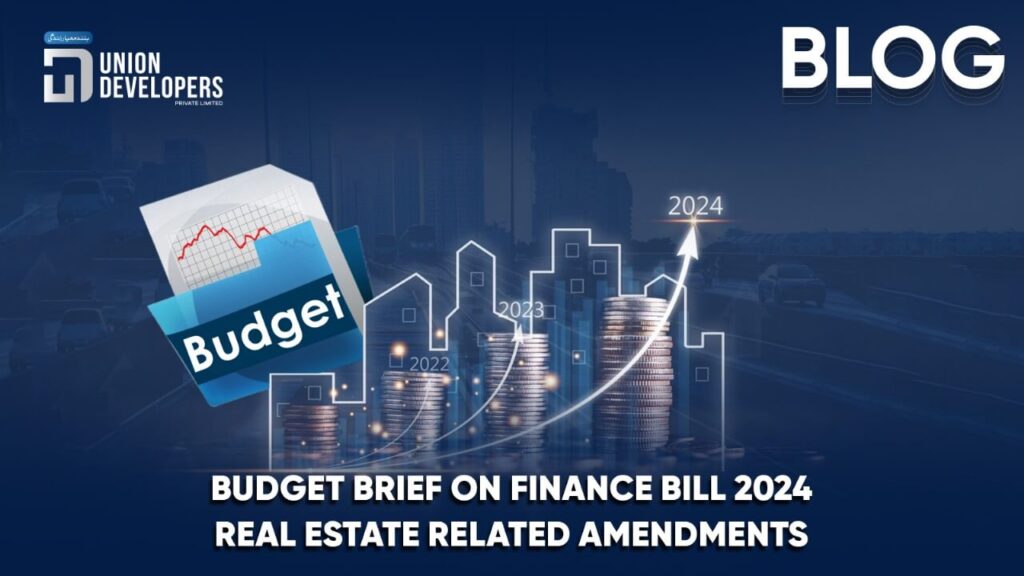Introduction to Pakistan Budget 2024
The recently tabled Finance Bill 2024 (Budget 2024-25 Pakistan) contains several amendments: that affect real estate directly through the income tax rates, advance tax on sale and purchase of immovable property and FED (federal excise duty). The following information elaborate all the changes with an aim to introduce stakeholders to understand fiscal regime.
Income Tax Amendments
Budget 2024-25 Pakistan, regrading to real estate brings the following amendments.
Capital Gains Tax on Immovable Property
The changes in Finance Bill 2024 indicate the specific rates of income tax, capital gains on the immovable property. Segmentation here is done by the date at which the specific property was acquired and with the type of property.

Properties Acquired Before 30th June 2024
For properties acquired before 30th June 2024, the bill specifies varying tax rates based on the holding period of the property:
Open Plots: 15% if such stock has been held for less than one year, then it reduces to the extent of 2.5% if held for two years, 1.25 % for the third year and so on until it reaches zero percent if held for more than six years.
Constructed Properties: At a rate of 15% percent if they have been held for less than 1 year and if they have been held for more than or over 40 years, the rate is 0%.
Flats: It ranges from 15% if the security has been held for less than one year to 0% percent if the security has been held for more than two years.
Tax Rates for Properties Acquired After 30th June 2024
For properties acquired after June 30, 2024, the following rates apply to filers and non-filers:
Filers: 15% of the capital gain.
Non-filers
Companies: Small companies will be charged 20% tax, banking companies 39% and other companies 29%.
Individuals and AOPs: Tax rates range from 0% for income below then 600,000 and 45% for incomes exceeding 5,600,000.
Income Tax Payable in Advance in Case of Sale of Immovable Properties

The bill proposes advance income tax rates under Section 236C based on the sale price of immovable property:
Sale Price < 50 million: It is 3% for the filers, 10% for people who have not filed their returns and 6% for those who filed their returns late.
Sale Price 50-100 million: The filers have to pay 3%, whereas the non-filers are 10% and the late-filers are 7%.
Sale Price > 100 million: Those who have filed taxes pay 4% while those who have not filed their taxes pay 10% and those who filed their taxes in the middle of the year pay 8%.
- Any other person having POC or NICOP is taxed at the status of a filer.
Advance Income Tax on Purchase of Immovable Property
Under Section 236K, the following advance income tax rates are proposed based on the fair market value of the property:
Fair Market Value < 50 million: Filers pay 3%, non-filers 12% and late-filers 6%.
Fair Market Value 50-100 million: Filers pay 3.5%, non-filers 16% and late-filers 7%.
Fair Market Value > 100 million: Filers pay 4%, non-filers 20% and late-filers 8%.
- Non-resident persons holding POC or NICOP are taxed at filer rates.
No Changes in following Key Sections
It literally carries out its policy of ‘No Changes in Key Sections’ none of these sections are altered.
Section 7E: They excluded tax on deemed income which has not changed.
Section 4C: No changes in super tax.
CVT on Foreign Assets: Self-Disclosure, no changes proposed.
Foreign Investment Scheme: Same as in original for non-resident persons having Roshan Digital Account (RDA) in Pakistan.
Federal Excise Duty

The Finance Bill 2024 proposes a 5% federal excise duty on:
• Section 2 Allotment or Transfer of Commercial Property
• First Allotment or Transfer of the Residence
These are; however, some of the measurable provisions which are given with conditions and restrictions as may be specified by the Federal Board of Revenue (FBR).
Implications for Stakeholders
Real Estate Developers
It has a wide impact on real estate developers where capital gains tax and advance income tax have been considered. It also means that developers have to study holding periods of the property in order to maintain optimal amount of tax to be paid.
Property Investors
Businessmen have to understand the difference between the rates for filers and non-filers particularly on the advance income tax on purchases and sales. The heavy penalties that NHFs (National Housing Fund) has set for non-filers may serve as a reason for more people to file for taxes to be able to fall under lower rates.
Individual Property Owners
In the case of owning a property, withholding tax implications are something that individual property owners that own properties for investment need to know. A progressive system is adopted for reducing the taxation rates regarding the length of holding periods of properties to encourage long-term investment options.
Companies
The fact that different forms of corporations are subjected at different levels of taxes makes the subject of properties very sensitive to any kind of flow in the market. Of all the sectors, the banking companies are charged the highest taxes; a factor that might serve to alter their real estate investments.
Strategic Recommendations
Filing Tax Returns
Therefore; to avoid the increase in calculated taxes, it is advisable that property owners and investors should registered themselves as filers. This is especially the case given that the filers are subjected to different tax rates than non-filers, so compliance is in the interest of the filers.
Long-Term Investment Planning
Another point of consideration in AV systems, that property owners and investors should consider taking longer holding periods in order to be able to take advantage of the existing rates to reduced capital gains tax rates. This strategy minimizes tax expenses whereas; it also complements the increased tax rates, targeting short-term oriented speculative investments.
Corporate Strategy
The real estate market situation and its influence on banks’ portfolios and property transactions should be analysed with regard of possible consequences for tax reforms. Small organizations may benefit from the new rate of 20%, thus there may be possible investments created in the real estate market.
Monitoring Legislative Changes
Another factor which is critical to all stakeholders is the need to compile additional legislation and amendments passed further. Due to the fact that tax laws are always changing, one needs to frequently review its strategies.
Conclusion
In the matters of Income Tax and Federal Excise Duty, the Finance Bill 2024 brings about a number of substantial amendments concerning the real estate sector. With the intention to reduce compliance burden and promote sustainable investments while increasing the rates for non-filers and short term/speculative activities. That means all the stakeholders ranging from residential, commercial and industrial developers, investors, owners of individual property among others have to well plan for the changes in a bid to increase their returns while reducing taxes.









